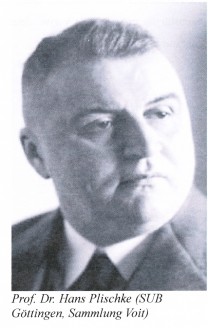Hans Plischke was born in Eilenburg/Saxony in 1890. There he spent his childhood years and attended school.
In 1910 Plische began to study in Anthropology, History and Natural Sciences not only in Munich and Göttingen but also in Leipzig. In 1914 he completed his Ph D thesis. Karl Weule was his doctoral adviser.
During his studies in Leipzig Plischke also held an assistant position at the local Ethnological Museum, where he was introduced to the museums tasks and acquired additional ethnographic knowledge. Eventually he took up a position at the newly founded Ethnological Research Center chaired by Karl Weule in 1914.
During World War I Plischke had to serve the German Army and unsuccessfully tried to do ethnographic research in Romania. He returned to Leipzig in 1918 and took up his assistant position at the Ethnological Research Center again. Moreover, Plischke began lecturing at the Ethnographic Seminar of the university in Leipzig in 1919. A year later the Institute for Ethnology was founded by Karl Weule and Plischke took up an assistant position there.
In 1924 Plischke finished his habilitation thesis and received his via legendi. Four years later Plischke began lecturing at the Georg-August-University in Göttingen. Furthermore, he was responsible for examining, extending and cataloguing its Ethnological Collection. In 1929 he took up a professorship for Anthropology in Göttingen. In 1934 the Institute for Cultural and Social Anthropology was founded and Plischke became its head chairman. A year later the Ethnographic Museum was officially inaugurated.
In 1933 Plischke had become a member of the National Socialist German Workers Party (Nationalsozialistische Deutsche Arbeiterpartei, NSDAP). Moreover, he became head of the Nationalsozialistische Dozentenschaft, a group of academics loyal to the Nazi regime. This group not only had an influence on political and staff decisions at the university but also sympathized with the increasing war propaganda. Moreover, Plischke was a member of the SS between 1933 and 1939. Since the early 1930´s the category race was part of his scientific and anthropological concept.
In 1940 Plischke became member of the academic senate of the university in Göttingen. A year later he chaired the philosophical faculty and eventually became head of the University until 1943. After World War II ended in 1945 the Institute for Cultural and Social Anthropology temporarily was closed. Plischke was suspended in January 1946.
After his denazification in 1948, Plischke continued his scientific work. He not only became head of the Ethnological Collection again but once more took up his professorship at the university in Göttingen. In 1949/50 Plischke returned to the Institute for Cultural and Social Anthropology and was its chairman until his retirement in 1958/59. He kept lecturing until 1964.
His scientific work included all world regions but specialized on Oceania. Plischke focussed both on historical research and the analysis of source material. Moreover he had an interest in the dialectical relationship between European discoveries since the 15th century and the cultures being explored. Plischke also did research on the historical development of the Ethnological Collection in Göttingen which he continuously extended. He also wrote a number of articles on its objects. Furthermore, he was editor of an encyclopedic series on ancient travelers and published a large number of books throughout his life.
Hans Plischke died in Göttingen in 1972.
(Text written by Vincenz Kokot in January 2012, based on BAA Prof. Riese and articles at http://www.deutsche-biographie.de and http://www.wikipedia.de)
Short Portrait: Hans Plischke

Hans Plischke
 further information
further information

